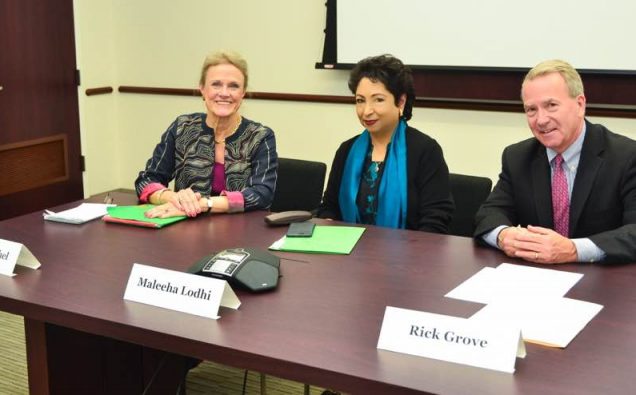
The U.S.-Pakistan relationship is important for regional and global peace and the two countries are working to reset their bilateral ties amid geopolitical shifts transforming the international environment, a top Pakistani diplomat emphasized at a discussion.
“The nature of the future relationship will determined by the terms of such re-engagement with the wider geopolitical dynamics obviously weighing in on calculations by the two sides,” Ambassador Maleeha Lodhi, Pakistan’s Permanent Representative to the UN, said in a wide-ranging presentation.
She was speaking at a discussion in New York hosted by the International Institute for Strategic Studies (IISS), a London-based international think tank.
Rick Grove, President of the U.S. Friends of the IISS, presided over the hour-long discussion on “Pakistan’s relations with the US in a changing world.Ambassador Robin Raphel, a former US Assistant Secretary of State, who last served as coordinator for non-military assistance to Pakistan, also was on the panel.
In her remarks, Ms. Raphel noted that despite ups and downs in their relationship, the United States, as a global power, cannot ignore Pakistan – an influential Muslim country, an emerging democracy with a powerful military.
The American diplomat noted Pakistan now feels more confident of itself because of its burgeoning relationship with China, and growing ties with Russia.
Still, she said that Pakistan needs the United States.
Ms. Raphel underscored the need for US and Pakistan to collaborate in efforts to promote a settlement to end the war in Afghanistan.
As a diplomat, she regretted that the overall efforts to deal with the Afghan war were more focused on a military solution rather than through a diplomatic process.
Articulating Pakistan’s position, Ambassador Lodhi underscored that peace could only be restored in Afghanistan through a negotiated settlement.
“This is also the firm consensus of the international community expressed repeatedly by the Security Council at the United Nations,” she said.
The immediate challenge for both the U.S. and Pakistan, she said, is to find a common approach to Afghanistan even though both agreed that the stability and security of Afghanistan was a shared interest.
Both countries have benefited when they worked together, the Pakistani envoy said, while referring to the U.S.-Pakistan cooperation in degrading the al Qaeda.
“Indeed, no one desires peace in Afghanistan more than Pakistan,” Ambassador Lodhi told her audience while recounting the economic and security troubles that have hurt Pakistan due to the festering Afghan insecurity.
“But from Pakistan’s perspective the ‘new’ US strategy in Afghanistan relies overly on military force and more fighting to achieve an outcome, which has proved to be elusive using these means for the past decade and half”, the Pakistani envoy remarked.
“Neither Kabul and the Coalition, nor the Afghan Taliban, can impose a military solution on each other,” she said, adding, “We therefore feel the US, Pakistan and Afghanistan need to actively work toward a peace process.”
Ambassador Lodhi noted that the immediate and realistic goals in Afghanistan should be concerted action to eliminate the presence in Afghanistan of Daesh, remnants of Al-Qaeda and their affiliates, including the Tehreek e Taliban Pakistan.
At the same time, she said, negotiations between Kabul and the Afghan Taliban – in the Quadrilateral Coordination Mechanism – should be encouraged to evolve a peaceful settlement.
She reaffirmed Pakistan’s commitment to fight terrorism and extremism, saying, “defeating terrorist violence is vital to realize our overriding priority of rapid economic and social development.”
In addition to facing economic and security fallout of the Afghan conflict, Pakistan continues to host over two and half million Afghan refugees.














